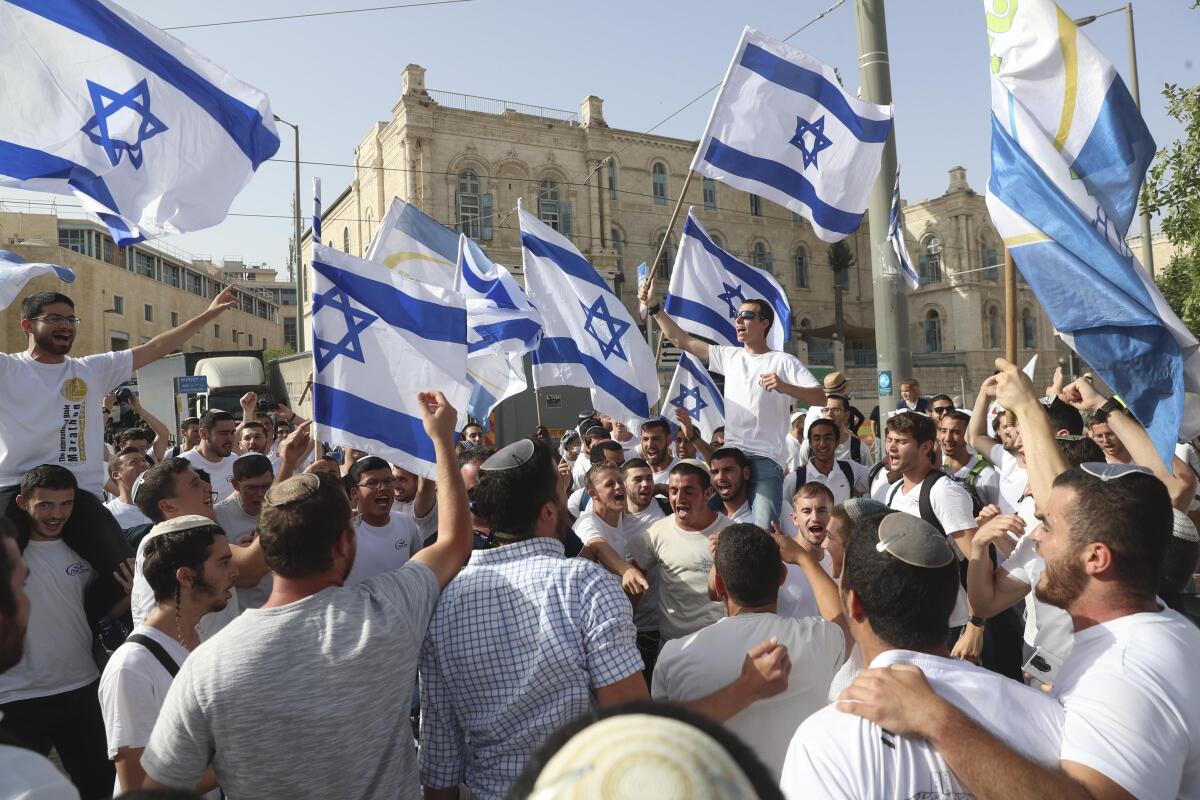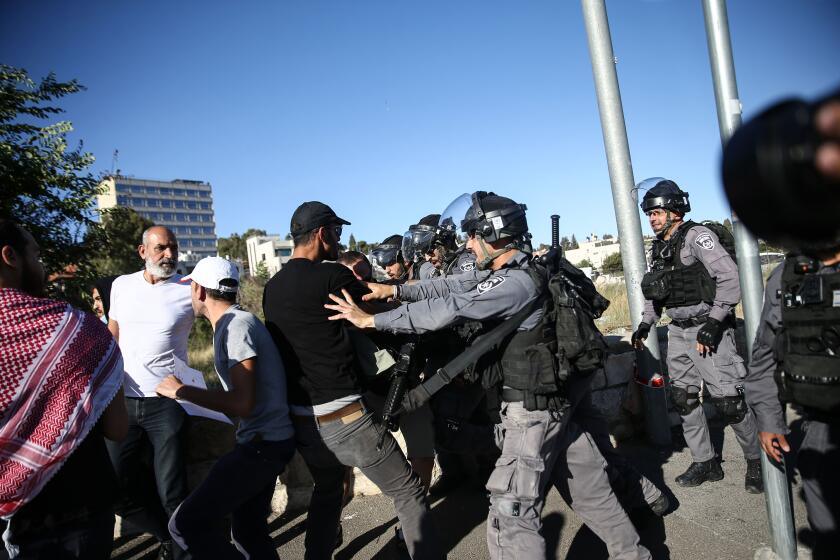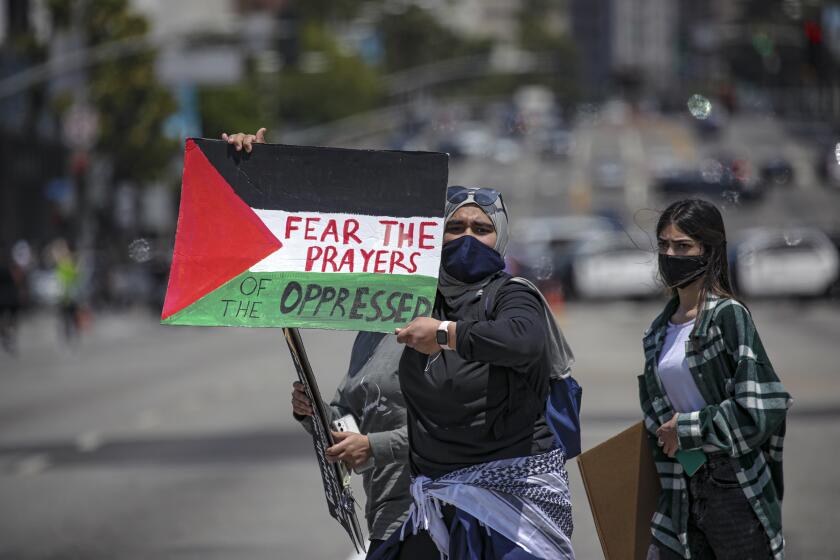Israel blocks Jewish ultra-nationalists’ march in East Jerusalem, for now

- Share via
JERUSALEM — Israeli police said Monday that they had blocked a planned procession by Jewish ultra-nationalists through parts of Jerusalem’s Old City, following warnings that it could reignite tensions that led to a punishing 11-day war with Gaza’s militant Hamas rulers last month.
The parade, which celebrates Israel’s capture of East Jerusalem in the 1967 Middle East War, was first scheduled for May 10 and had gotten underway when Hamas fired rockets from Gaza toward the contested holy city in protest. Both Israelis and Palestinians claim Jerusalem, in part or in full, as their capital.
The rocket fire triggered reprisals by Israeli forces, an engagement that continued until a cease-fire took effect May 21. Some 254 people were killed in Gaza and 13 in Israel.
The war was preceded by weeks of confrontations between Israeli police and Palestinian demonstrators in Jerusalem’s Old City and in the nearby neighborhood of Sheikh Jarrah, where Jewish settlers have waged a decades-long campaign to evict Palestinian families from their homes.
On Monday, Israel’s attorney general declined to intervene in the cases of several of the families, making it more likely that the evictions will be carried out — possibly in the coming weeks. That could also spark more violence.
The procession, whose intended route goes through the Old City’s Muslim Quarter, is seen by Palestinians as a provocation.
As the latest cease-fire continues to hold, competing claims to Jerusalem by Israel and Palestinians will likely fuel new fighting, both sides say.
In a statement, police said the proposal to hold the parade later this week was not approved but that new plans would be considered. Organizers accused the police of caving in to pressure from Hamas.
Bezalel Smotrich, leader of the far-right Religious Zionism party, tweeted a warning to embattled Prime Minister Benjamin Netanyahu “not to give in to Hamas threats.”
Renewed tensions in East Jerusalem or fighting with Hamas could complicate Israel’s shaky politics. Netanyahu’s opponents last week said they had formed a coalition that could remove him from the office he’d held for the last 12 years. The new coalition is expected to be sworn into office in the coming days.
Over the weekend, Israeli police arrested and released a veteran reporter for the Al Jazeera satellite channel who had regularly been covering the Sheikh Jarrah protests. And on Sunday, authorities stormed the home of a leading activist in the neighborhood, arresting her and her brother. The siblings were later released.
Social media users say they’ve been been censored for views expressing support for Palestinians and criticism of Israel. Employees of Facebook and Google have also accused the companies of bias.
Before Muna Kurd was freed, police briefly clashed with a crowd outside the station, throwing stun grenades at the protesters.
Israel captured East Jerusalem, which is home to sites sacred to Jews, Christians and Muslims, in the 1967 war and annexed it in a move not recognized internationally. Israel views the entire city as its capital, while the Palestinians want East Jerusalem as the capital of their future state.
The settlers are using a 1970 law that allows Jews to reclaim formerly Jewish properties lost during the 1948 war surrounding Israel’s creation, a right denied to Palestinians who lost property in the same conflict. At least 150 Palestinian households, in Sheikh Jarrah and the neighborhood of Silwan, both near the Old City, are at risk of eventual eviction.
A request by the attorney general at the height of the tensions last month led to the postponement of a Supreme Court hearing on the most imminent evictions, of four extended families comprising six households in Sheikh Jarrah.
News Alerts
Get breaking news, investigations, analysis and more signature journalism from the Los Angeles Times in your inbox.
You may occasionally receive promotional content from the Los Angeles Times.
But in a statement issued Monday, Atty. Gen. Avichai Mandelblit said that “there is no place” for him to intervene in the proceedings. That sends the matter back to the Supreme Court, which is expected to rule against the families.
Ir Amim, an Israeli human rights group that closely follows the various court cases, says the four families could be evicted within the coming month, and that the attorney general’s decision could affect the cases of more than 80 other families threatened with eviction.
“It paves the way for the evictions to be carried out,” said Amy Cohen, a spokeswoman for Ir Amim. But she added that Israeli authorities still had various options for postponing or halting the evictions. “There still is room for political intervention,” she said.
The threatened evictions have been widely criticized internationally, including by the United States, Israel’s closest ally.
More to Read
Sign up for Essential California
The most important California stories and recommendations in your inbox every morning.
You may occasionally receive promotional content from the Los Angeles Times.












